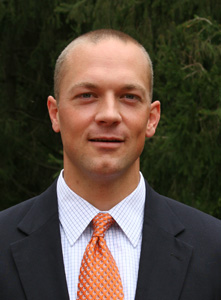 How do you define well-being? What do you do to achieve it?
How do you define well-being? What do you do to achieve it?
Balance
“Well-being is more than just being able to physically meet the daily challenges of life. A positive mental approach to life is essential in being well grounded and happy. For me, I have set certain goals and objectives in my life to be well and healthy. One has to work vigilantly every day to achieve well-being. No excuses about not having time or ability.”
- Dudley Burgess ’64 (at left)
“I define well-being as a good balance. Good physical health, healthy food, opportunity to exercise, family time, involvements including faith, volunteerism, neighborhood. I have to be very intentional about trying to strike a balance. I could work a lot more than I do but I make myself leave the office to get in some exercise. I am also very intentional about saving time for my spouse and our extended families. Time with friends is also very important to me and is something that requires intentionality.”
- Marcus White ’91
 “I’ve made a concentrated effort to carve out more time for family and some just for me, especially when I’m travelling. Even with the crazy hours I keep in Admissions, I make sure I spend part of each day solely as ‘Dad,’ ‘Husband,’ ‘Chip,’ and tell ‘Associate Director of Admissions Chip’ to get lost.
“I’ve made a concentrated effort to carve out more time for family and some just for me, especially when I’m travelling. Even with the crazy hours I keep in Admissions, I make sure I spend part of each day solely as ‘Dad,’ ‘Husband,’ ‘Chip,’ and tell ‘Associate Director of Admissions Chip’ to get lost.
- Chip Timmons ’96 (at right)
“Trying to find balance between the things we want to do and the things we should do. Whether that’s deciding I’m going to lay on the couch and relax or I’m going to go exercise. Am I going to work these extra hour or am I going to make it home in time to have dinner with my family? Am I going to take this promotion just because it’s a promotion or do I really need to think about the impact this is going to have on my overall quality of life?
“ For me, a lot of wellness has to do with that eternal striving for balance in those different parts of life when I’m being pulled in so many different directions.”
- Chris Bojrab ’89
"For me, being able to get a good night’s sleep and feel rested when I awake is my barometer of well-being. My sleep and daily energy levels usually are off when I have too much stress, too much food or alcohol, and not enough exercise. When these things are in balance, I feel well.”
-John Panozzo ’89
"Most people define health as the absence of disease. While not being “sick” is part of being healthy, you have to include other factors. These factors include financial, social and emotional well-being, psychological wellness, and perhaps most importantly, an active pursuit of the prevention of disease. In other words, just because you do not take medications, or do not “need” to see a doctor, you are not necessarily healthy. A person who lives in moderation, controls the diseases he or she has, and actively pursues wellness is truly healthy.
"My greatest health concern is access to health care services. As a society, we have an obligation to take care of even our poorest and most disenfranchised. No matter how many advances in medicine we make, no matter how many cures we develop, if we do not emphasize prevention, and therefore access, we will never achieve wellness on a global scale.
"Well-being is the cumulative result of a life lived to the fullest. To truly be well, you must combine personal happiness with a concerted effort to be a productive and responsible member of society.
"To achieve well-being, I try to balance each aspect of my life. While I work a great number of hours, I try to include personal and social time. For me, this involves my daily run and set dinner “dates” with friends. Also, I volunteer with a few social groups whose causes I find particularly compelling. This combination of activities allows me to achieve a balance between personal, family and social responsibility.
—Karl Grimmer ’03